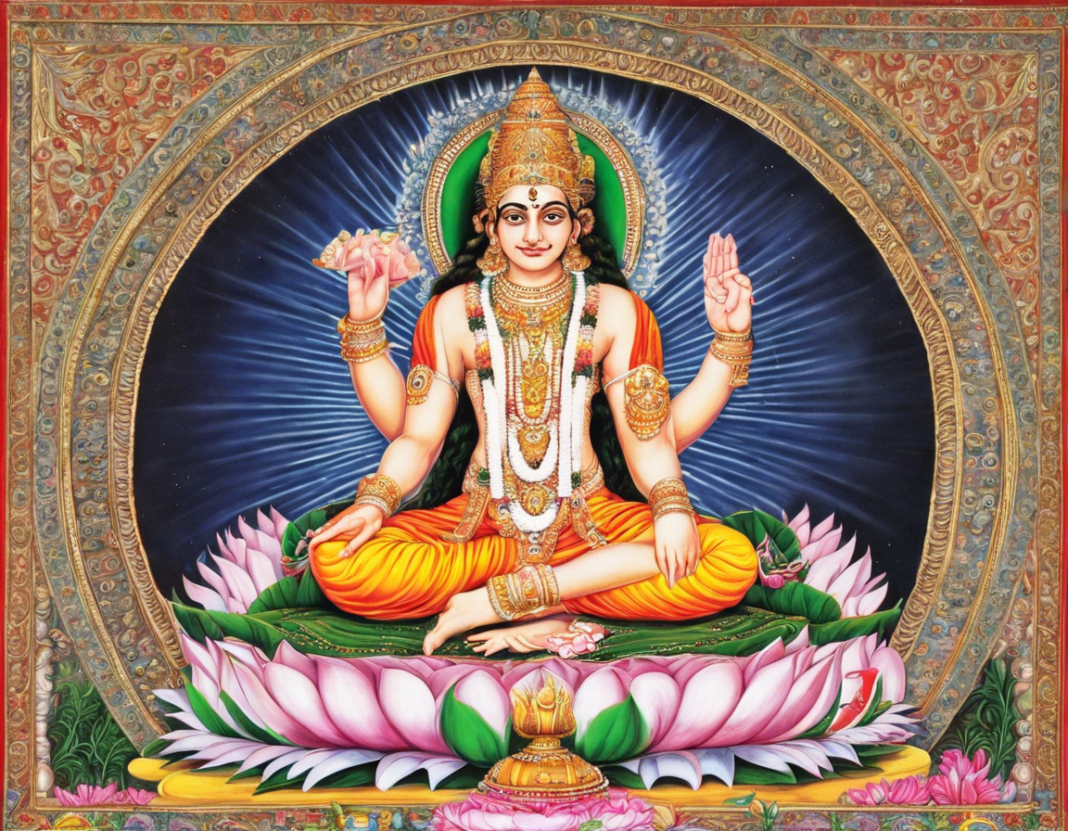The Brahma Vaivarta Purana is widely regarded as one of the major eighteen Puranas, a genre of ancient Indian texts that are part of Hindu literature. Comprising of four parts, namely Brahma Khanda, Prakriti Khanda, Ganapati Khanda, and Krsna Janma Khanda, this Purana holds immense significance in the realm of Hindu mythology and spirituality. In this article, we delve into the rich tapestry of stories, teachings, and wisdom encapsulated within the Brahma Vaivarta Purana to unravel its profound essence.
Understanding the Essence of Brahma Vaivarta Purana
Origin and Significance
The Brahma Vaivarta Purana is believed to have been originally narrated by the deity Lord Brahma to Narada Muni. It primarily focuses on the manifestation of Lord Krishna as the supreme being and his myriad leelas (divine pastimes) on Earth. The Purana elucidates the principles of Brahman (the absolute reality), Prakriti (nature), and Purusha (the cosmic spirit), thereby offering insights into the nature of reality and existence.
Themes and Narrative
Several key themes run through the narrative of the Brahma Vaivarta Purana, including the concept of creation, the cyclical nature of time, the importance of devotion (bhakti) towards the divine, the significance of dharma (righteousness), and the power of Vedanta philosophy. The text also emphasizes the worship of various deities such as Radha-Krishna, Ganesha, and Surya (the sun god) as a means to attain spiritual liberation and inner peace.
Krishna Janma Khanda
The last section of the Purana, known as Krsna Janma Khanda, is particularly dedicated to the life and teachings of Lord Krishna. It chronicles Krishna’s birth in the prison of Mathura, his childhood exploits in Vrindavan, his role in the great Mahabharata war, and his profound conversations with Arjuna in the Bhagavad Gita. The Krsna Janma Khanda serves as a spiritual reservoir of wisdom and ethical guidance for devotees seeking enlightenment.
Teachings and Morals
Embedded within the stories and dialogues of the Brahma Vaivarta Purana are timeless teachings and moral lessons. The Purana advocates the practice of compassion, humility, selflessness, and detachment as pathways to spiritual evolution. It underscores the importance of Karma (action), Bhakti (devotion), and Jnana (knowledge) in realizing one’s true self and attaining union with the divine.
Exploring the Relevance of Brahma Vaivarta Purana Today
Spiritual Guidance
In the contemporary world, the teachings of the Brahma Vaivarta Purana continue to offer spiritual solace and guidance to seekers of truth. Its emphasis on the eternal truths of existence, the impermanence of material life, and the omnipresence of divine grace resonates with individuals navigating the complexities of modern living. The Purana serves as a beacon of light, illuminating the path towards self-realization and inner harmony.
Cultural Heritage
Beyond its spiritual significance, the Brahma Vaivarta Purana stands as a cornerstone of India’s cultural heritage. Its vibrant narratives, colorful mythological tales, and profound philosophical discourses enrich the tapestry of Indian literature and folklore. The Purana inspires artists, poets, scholars, and practitioners alike, fostering a deep sense of cultural pride and heritage preservation.
Universal Wisdom
The wisdom encapsulated within the Brahma Vaivarta Purana transcends religious boundaries and speaks to the universal quest for meaning and purpose. Its teachings on love, devotion, duty, and cosmic harmony resonate with individuals from diverse walks of life, fostering a sense of interconnectedness and spiritual unity. The Purana’s message of oneness and divine love serves as a unifying force in a world beset by divisions and conflicts.
Frequently Asked Questions (FAQs) About Brahma Vaivarta Purana
1. What is the significance of the name “Brahma Vaivarta Purana”?
The name “Brahma Vaivarta Purana” indicates a conversation between Lord Brahma and Narada Muni, emphasizing Brahma’s role as the primary narrator of the Purana.
2. How does the Brahma Vaivarta Purana portray the divinity of Lord Krishna?
The Purana depicts Lord Krishna as the supreme personality of Godhead, showcasing his unparalleled power, wisdom, and divine love for humanity.
3. What are the key philosophical teachings of the Brahma Vaivarta Purana?
The Purana expounds on the concepts of Brahman, Atman, Karma, Dharma, and Bhakti, offering profound insights into the nature of reality and spiritual evolution.
4. Is it necessary to have prior knowledge of Hindu mythology to understand the Brahma Vaivarta Purana?
While some familiarity with Hindu mythology may enhance comprehension, the Purana’s stories and teachings are accessible to all individuals seeking spiritual wisdom and inner growth.
5. How can one incorporate the teachings of the Brahma Vaivarta Purana into daily life?
Practicing acts of devotion, compassion, selflessness, and mindfulness can help individuals embody the ethical and spiritual precepts outlined in the Purana.
In conclusion, the Brahma Vaivarta Purana stands as a timeless reservoir of wisdom, offering seekers a profound glimpse into the nature of reality, the power of devotion, and the essence of divine love. Through its narratives, teachings, and moral lessons, this Purana continues to inspire and enlighten individuals on the spiritual path, beckoning them towards a deeper understanding of the self and the cosmos.









